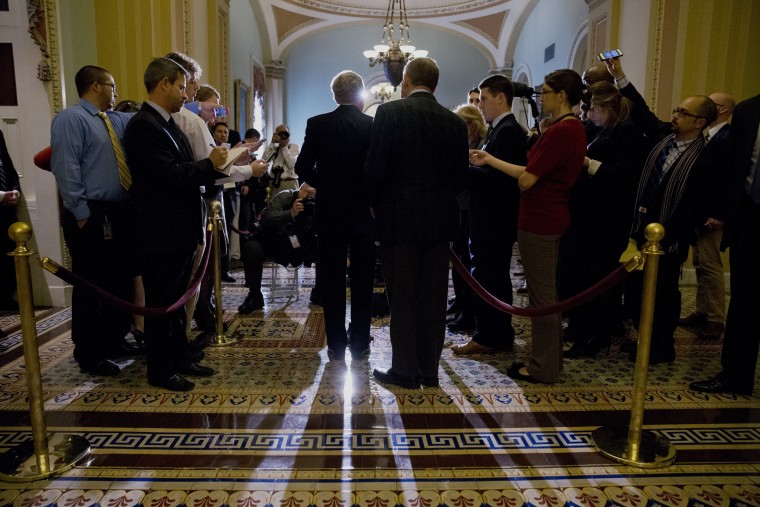When it comes to Senate filibusters and the "nuclear option," there's plenty of hypocrisy to go around. It's as easy for Democrats to dig up Republican quotes in support of the idea from the Bush/Cheney era as it is for Republicans to do the opposite. Clearly, perspectives change dramatically based on which party enjoys majority status at the time.
But some went further than others, and have ended up with credibility so tarnished that they should probably sit out the debate altogether.
Here, for example, was Sen. Lamar Alexander (R-Tenn.) in 2003:
"I will pledge to do what the Senator from Utah pledged to do. While I am a United States Senator, if a nominee comes to the floor for a judgeship by any president, Democrat or Republican, I will not participate in a filibuster," he said. "I will vote to cast an up-or-down vote on any nominee of any president. I think that is the right thing to do."
And here was Alexander again in 2005:
On April 12, he said he "would never filibuster as long as I were a senator." On May 20, he said while he may vote against a nominee he doesn't support, he will "insist that we eventually vote up or down, as the Senate has for two centuries." And on June 9, he said he made a pledge that "I would never filibuster any president's judicial nominee. Period."
Once President Obama was elected, the Tennessee Republican did the exact opposite, joining a series of filibusters of judicial nominees, including the recent D.C. Circuit blockade. Alexander gave his word, and then he broke it. He made a public vow, and then he abandoned it. The moment it suited his partisan goals, the senator no longer had any use for his pledge.
For all the hypocrisy surrounding this issue -- on both sides -- Alexander appears uniquely brazen.
And so it was curious, to put it mildly, to see Alexander with a lengthy Washington Post op-ed over the weekend, in high dudgeon over "the most dangerous restructuring of Senate rules since Thomas Jefferson wrote them." The Tennessean, who made no mention of his broken promises, spent over 800 words making the case that Republican obstructionism just isn't that bad, and that returning the Senate confirmation process to the way it functioned for centuries invites "tyranny of the majority."
Given his background, maybe Republicans could have chosen a more credible point person for the debate? At a minimum, shouldn't Alexander offer some kind of explanation for his actions before condemning Democrats for dealing with the obstructionism he personally made worse?
But even putting all of this aside, if Republicans are going to continue to complain about the "nuclear option," there is a straightforward follow-up: they can promise to undo it the next time they're the majority party. If the GOP is so offended, the party can even make it part of its platform: vote Republican for more filibusters, now and forever.
That appears unlikely. Indeed, as Isaac Chotiner noted, just the opposite seems to be true: "In short, the Republicans are angry that Democrats are doing something so undemocratic, so unconstitutional, so disrespecting of minority rights that ... Republicans are threatening to do the exact same thing once in power. This is the type of ethics that you find among kindergarteners ('you stole my toy, so it's okay to steal yours'), or people who believe in some crude version of an eye-for-an-eye."
